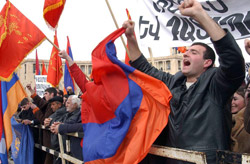Nobody was surprised to find out that the Kocharyan-Aliev meeting in France on February 10-11 was in vain. I don’t think anyone will hallucinate and claim that the future meetings will be effective, if of course, there are any meetings. The co-chairmen were simply optimistic of the meeting based on the “right time” principle, that’s all.
It was this principle that united the two presidents and sat them at a round table. The co-chairmen actually thought that neither side would come up with a reason to delay the Karabagh conflict settlement. What could the presidents say? What reason could they come up with? After all, there are no political events this year, which could lead to a change in power in neither country.
The co-chairmen probably didn’t take into consideration the period during which the negotiations were to be held. Also, they hadn’t really brushed up on history and remember that neither Azerbaijan nor Armenia forgets the atrocities committed in the same month of the negotiations-February. I shouldn’t really point out the fact that the Rambuye meeting scheduled for February 11 is just two days before February 13 and that it was precisely that day eighteen years ago when the Karabagh movement started in Stepanakert. I also shouldn’t point out the fact that February 11 is just nine days before February 20, when Yerevan joined the Karabagh movement.
Of course, these dates are very important both for Armenians and Azerbaijani. But I don’t want to recall any more historical dates because what follows are the tragic and, at the same time, heroic events.
Even schoolchildren know that Kocharyan and Aliev not only don’t want to, but also are not morally and psychologically ready to settle the Karabagh conflict. There is no need to talk about that since I have touched upon that in my previous articles. But are both presidents really that honest to confess that they can’t do anything? Of course they aren’t.
Each president has promised the people to “return” and “not give” respectively just to be proclaimed almighty, however, neither one of them is sure on whether their promises are realistic or not. Since each president relies on those promises as a means to increase his reputation and since the international community demands them to make compromises, they have nothing left but to delay the process. This is probably the reason why American co-chairman of the Minsk Group Steven Mann declared that the Karabagh conflict could be settled either today or in a hundred years. Steven Mann is an experienced politician and he should have known that the presidents making these promises have a really strong resource for delaying the process and can even use that resource up to the point where they actually fool the people.
This is why I think that the co-chairmen of the Minsk Group did not choose the right time for the negotiations. If the negotiations were to be scheduled for March 10-11, instead of February 10-11, perhaps neither side would not be so hysterical and start the propaganda of the word xenophobia.
After the meeting, the president of Azerbaijan would surely order some NGO to name Ramil Safarov “Man of the Year” for killing Armenian spy Gurgen Markaryan two years ago on February 18. This, of course, was to become the beginning of the ceremony dedicated to the Khojalu tragedy.
The Armenian side was not supposed to celebrate Stepanakert’s liberation from Khojalu, but rather it was supposed to organize a ceremony in honor of the victims of the Sumgait massacres and put that in comparison with the atrocities of Ramil Safarov and the criminals of Sumgait. By forcing thousands of schoolchildren and students to come to Republic Square (as an excuse to skip classes), members of Armenia’s political elite must have forgotten that the fathers and older brothers of those children and students had fought in the Karabagh war and that the people, whom they are speaking to, are the people who, although haven’t fought for the country, however, have felt the pain and suffering of the dark years.
I somewhat understand why Azerbaijan is doing what it does. The Azerbaijani authorities don’t really have anything to offer the thousands and thousands of refugees and people who have lost their dignities, besides war declarations and the threat of a new war. They have to show the people that, parallel to keeping power, property and becoming stronger, they are patriotic and love the people. Excuse me, but I must say that even their promise “to return” is humanistic.
What I don’t understand is how Armenians are reacting. Instead of achieving great heights after cease-fire, they want to bring back 1988 when Armenians were mainly thinking about the effects of the Genocide and the only thing they wanted was revenge. I don’t understand how Armenian authorities can promise the restart of a war to generations of soldiers who fought in the war.
Pessimists feel a war coming. I am not pessimistic and I don’t believe that a war is coming, but I am not optimistic either because there are other historical dates, other tragic events which allow the presidents’ to keep their resource for delaying the process for all time.

